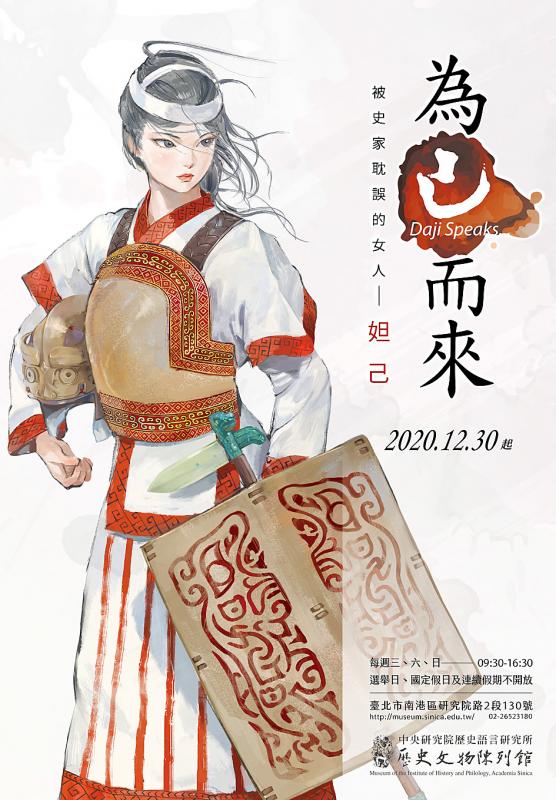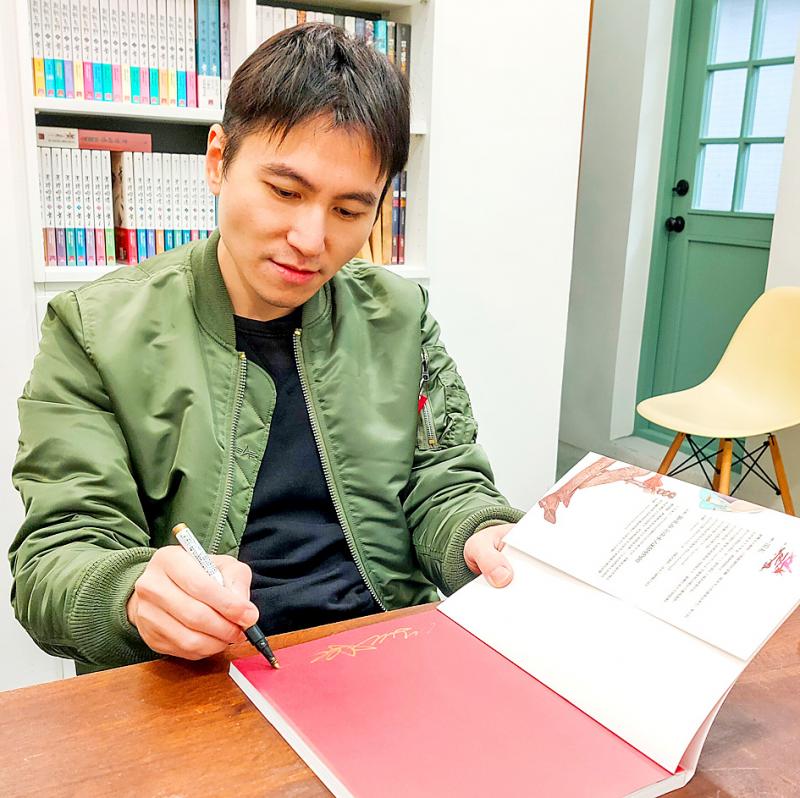Historical Chinese figure Daji (妲己), who is often described in literature as a malevolent spirit, was actually a female general who helped her husband, King Zhou (紂王) of the Shang Dynasty, in battle, a researcher said.
Historical texts generally describe Daji as King Zhou’s favorite concubine, and in novels and legends she is depicted as a malevolent fox spirit who was responsible for the downfall of the dynasty, said Hwang Ming-chorng (黃銘崇), a research fellow at Academia Sinica’s Institute of History and Philology.
However, research has shown that the queens of the Shang Dynasty wore armor and were required to follow the king onto the battlefield, he said.

Photo courtesy of the Institute of History and Philology
The museum commissioned graphic artist Chi You (蚩尤) to paint a likeness of Daji based on its records and artifacts about her to display as part of its permanent collection, he said.
“It’s a very formidable image. She is holding a shield with a zoomorphic pattern, and a bronze battle ax, and her face has the same characteristics seen in bronze masks from the era,” he said.
Huang, who is also director of the museum, said that women in the Shang Dynasty held high social status, and those of nobility were especially active in the royal court’s affairs.

Photo courtesy of the Tamsui Historical Museum
“Take Lady Hao (婦好) [the queen during the reign of King Wu Ding (武丁)], for example. She had to preside over ceremonies, participate in politics and even lead troops into battle,” he said.
Documents showed that Lady Hao was responsible for surrounding and capturing enemy forces, after Wu Ding and other generals drove them back, he said, adding that she would bring captured prisoners to Yinshang, which is now Anyang in China’s Henan Province.
“Queens during the Shang Dynasty all led troops into battle, so it stands to reason that Daji would have done so as well,” he said.
During the final battle of Shang, before the rise of the Zhou Dynasty, Daji and King Zhou escaped under the protection of the remaining Shang troops to the Deer Terrace Pavilion, where they committed self-immolation, he said.
“Confucians in later dynasties attempted to rewrite history by blaming the fall of the Shang on Daji, accusing her of meddling in politics,” he said.
Citing as an example Queen Bao Si (褒姒) of the Zhou Dynasty, Huang said that Chinese historiography often vilified women.
Bao Si is blamed in historical texts for the fall of Western Zhou, as it is said that King You (周幽王) lit warning beacons around the city numerous times to make her laugh, which allegedly resulted in an attack on the Zhou capital.
Huang said that this is untrue, as research has shown that there were no beacon towers in use during that period.

Alain Robert, known as the "French Spider-Man," praised Alex Honnold as exceptionally well-prepared after the US climber completed a free solo ascent of Taipei 101 yesterday. Robert said Honnold's ascent of the 508m-tall skyscraper in just more than one-and-a-half hours without using safety ropes or equipment was a remarkable achievement. "This is my life," he said in an interview conducted in French, adding that he liked the feeling of being "on the edge of danger." The 63-year-old Frenchman climbed Taipei 101 using ropes in December 2004, taking about four hours to reach the top. On a one-to-10 scale of difficulty, Robert said Taipei 101

Nipah virus infection is to be officially listed as a category 5 notifiable infectious disease in Taiwan in March, while clinical treatment guidelines are being formulated, the Centers for Disease Control (CDC) said yesterday. With Nipah infections being reported in other countries and considering its relatively high fatality rate, the centers on Jan. 16 announced that it would be listed as a notifiable infectious disease to bolster the nation’s systematic early warning system and increase public awareness, the CDC said. Bangladesh reported four fatal cases last year in separate districts, with three linked to raw date palm sap consumption, CDC Epidemic Intelligence

US climber Alex Honnold left Taiwan this morning a day after completing a free-solo ascent of Taipei 101, a feat that drew cheers from onlookers and gained widespread international attention. Honnold yesterday scaled the 101-story skyscraper without a rope or safety harness. The climb — the highest urban free-solo ascent ever attempted — took just more than 90 minutes and was streamed live on Netflix. It was covered by major international news outlets including CNN, the New York Times, the Guardian and the Wall Street Journal. As Honnold prepared to leave Taiwan today, he attracted a crowd when he and his wife, Sanni,

Taiwanese and US defense groups are collaborating to introduce deployable, semi-autonomous manufacturing systems for drones and components in a boost to the nation’s supply chain resilience. Taiwan’s G-Tech Optroelectronics Corp subsidiary GTOC and the US’ Aerkomm Inc on Friday announced an agreement with fellow US-based Firestorm Lab to adopt the latter’s xCell, a technology featuring 3D printers fitted in 6.1m container units. The systems enable aerial platforms and parts to be produced in high volumes from dispersed nodes capable of rapid redeployment, to minimize the risk of enemy strikes and to meet field requirements, they said. Firestorm chief technology officer Ian Muceus said